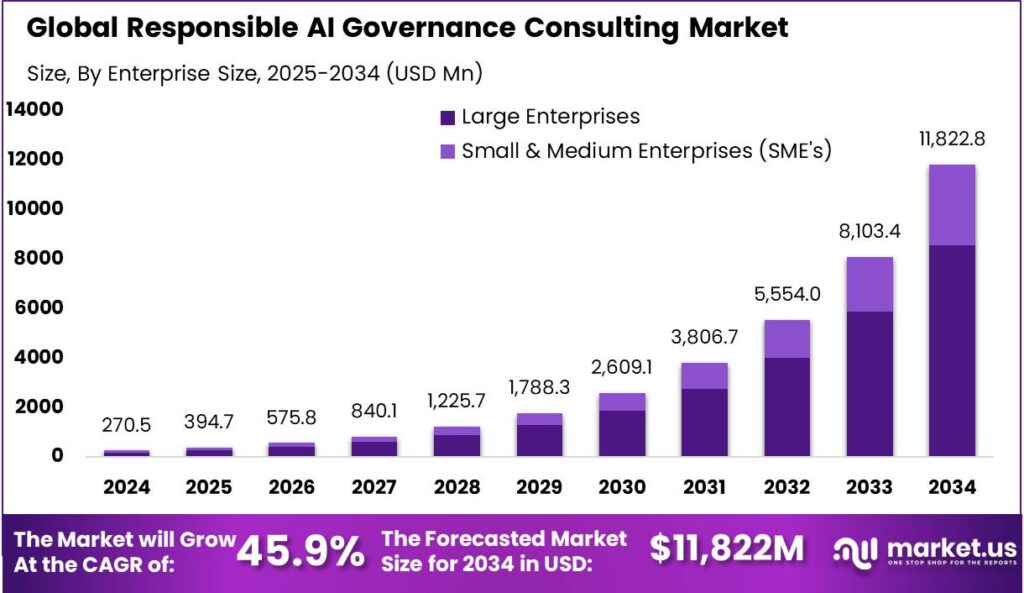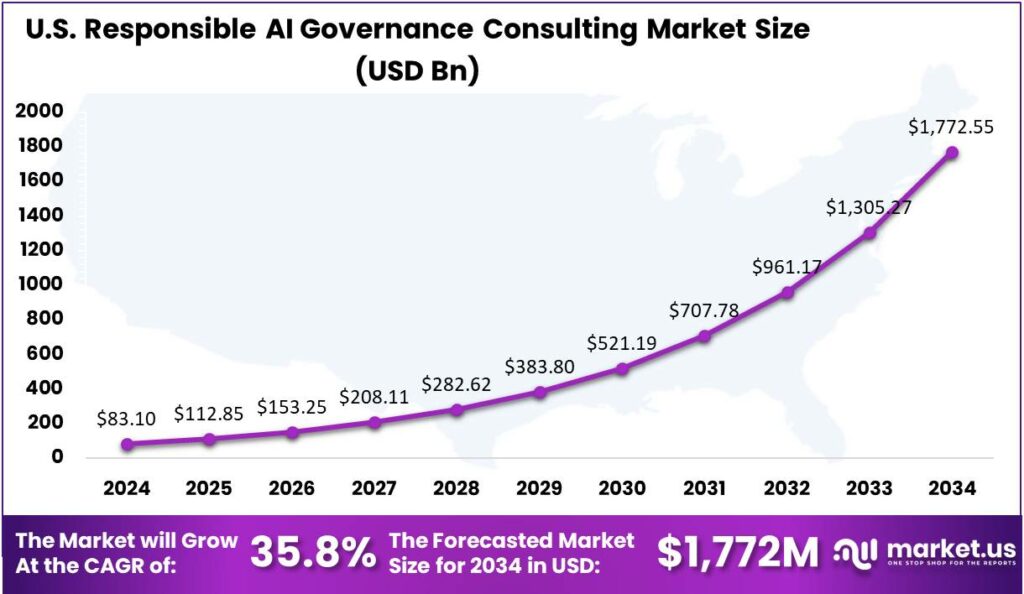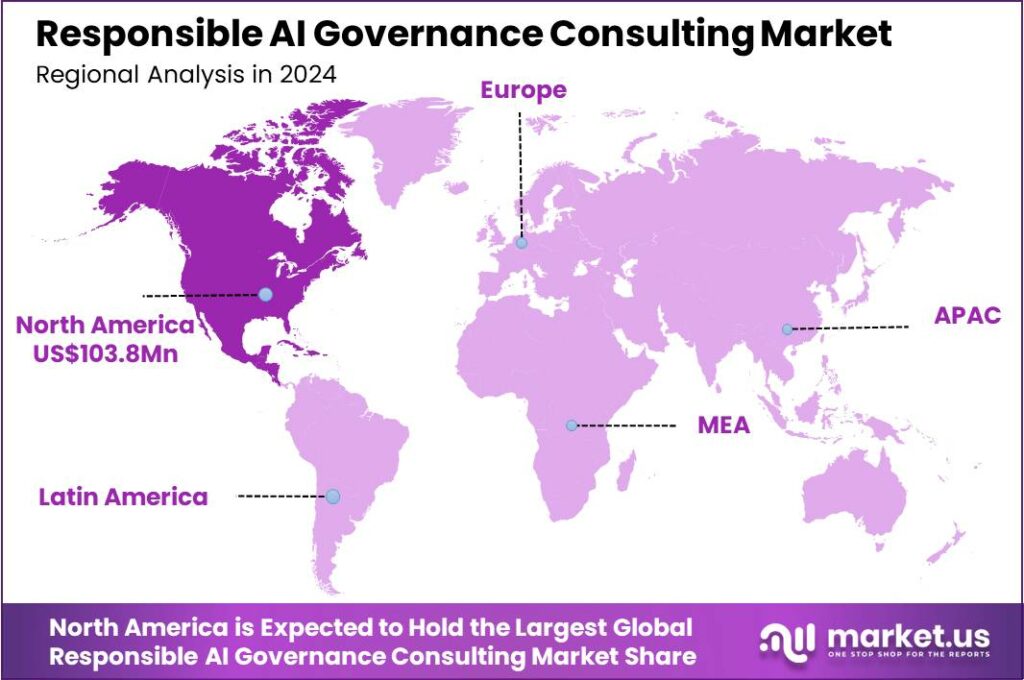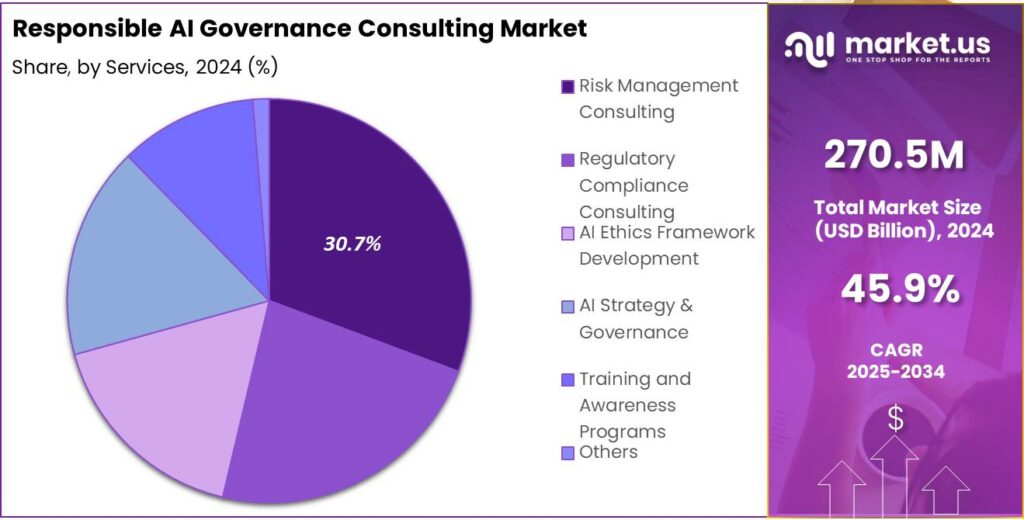Global Responsible AI Governance Consulting Market Size, Share, Statistics Analysis Report By Services (Risk Management Consulting, Regulatory Compliance Consulting, AI Ethics Framework Development, AI Strategy & Governance, Training and Awareness Programs, Others), By Enterprise Size (Large Enterprises, Small & Medium Enterprises (SME's)), By Industry (BFSI, Government and Defense, Healthcare and life sciences, Media and Entertainment, Retail, IT and Telecommunication, Automotive, Others), Region and Companies - Industry Segment Outlook, Market Assessment, Competition Scenario, Trends and Forecast 2025-2034
- Published date: February 2025
- Report ID: 139411
- Number of Pages: 262
- Format:
-
keyboard_arrow_up
Quick Navigation
Report Overview
The Global Responsible AI Governance Consulting Market size is expected to be worth around USD 11,822 Million By 2034, from USD 270.5 Million in 2024, growing at a CAGR of 45.90% during the forecast period from 2025 to 2034. North America led the market in 2024, holding more than 38.4% of the market share, which amounted to approximately USD 103.8 million in revenue.
Responsible AI Governance Consulting focuses on providing expert advice and strategies to ensure the ethical development, deployment, and management of artificial intelligence (AI) systems. This branch of consulting assists organizations in adhering to ethical standards and regulatory requirements while implementing AI technologies.
The goal is to foster transparency, accountability, and fairness in AI systems, reducing biases, building trust, and protecting human rights. Consultants collaborate with companies to develop frameworks and policies that guide ethical AI use, ensuring alignment with societal benefits and organizational values.
The growth of the Responsible AI Governance Consulting Market is primarily driven by increasing awareness of the ethical implications of AI and stricter regulations surrounding its use. As AI integrates into critical sectors like healthcare, finance, and law enforcement, the demand for effective risk management frameworks has surged.

Companies are investing in AI governance structures to avoid reputational damage and legal risks, ensuring transparency and accountability. Growing concerns over privacy and data security are driving businesses to adopt responsible AI practices to maintain consumer trust and comply with global data protection laws.
The rise in Responsible AI Governance Consulting parallels the growing adoption of AI in industries like finance, healthcare, and automotive. As public awareness of AI risks increases, so does the demand for governance frameworks to prevent ethical issues. High-profile cases of AI misuse have further fueled calls for stricter oversight and clearer industry standards.
The market is ripe with opportunities, particularly in developing frameworks for transparency and accountability in AI applications.The demand for AI ethics training, certification programs, impact assessment tools, and policy advice is growing as more industries adopt AI. This creates significant potential for specialized consulting services to ensure responsible AI use.
An IBM IBV survey revealed that 47% of respondents have established a generative AI ethics council to create and manage ethics policies and mitigate generative AI risks. In addition, they found that spending on AI ethics has steadily increased from 2.9% of all AI spending in 2022 to 4.6% in 2024 and is expected to increase to 5.4% in 2025.
Market expansion in Responsible AI Governance Consulting is expected to accelerate as technology advances and the implications of AI become more pervasive in everyday life. Expansion is likely to be supported by international collaborations to standardize AI governance practices and by the increasing involvement of governmental bodies seeking to regulate AI deployment.
Key Takeaways
- The Global Responsible AI Governance Consulting Market is projected to reach USD 11,822 Million by 2034, up from USD 270.5 Million in 2024, reflecting a CAGR of 45.90% from 2025 to 2034.
- In 2024, the Risk Management Consulting segment dominated the market, accounting for over 30.7% of the total share.
- The Large Enterprises segment held a commanding position in the market in 2024, capturing more than 72.5% of the market share.
- The BFSI (Banking, Financial Services, and Insurance) sector was the leading segment in 2024, contributing over 28.6% to the market share.
- North America led the market in 2024, holding more than 38.4% of the market share, which amounted to approximately USD 103.8 million in revenue.
- The United States, valued at USD 83.1 million in 2024, is expected to see a robust CAGR of 35.8% in the Responsible AI Governance Consulting market.
U.S. Market Size
The market for Responsible AI Governance Consulting in the United States, which was valued at $83.1 million in the year 2024, is anticipated to expand at a robust compound annual growth rate (CAGR) of 35.8%. This significant growth trajectory underscores the increasing importance of ethical considerations and governance frameworks in the deployment of AI technologies.
Market expansion is driven by increased regulatory scrutiny and public demand for transparency in AI. Companies seek consulting services to navigate legal, ethical, and technical requirements. Responsible AI consultants help develop governance structures that comply with current regulations and anticipate future legislative and societal expectations.

In 2024, North America held a dominant market position in the Responsible AI Governance Consulting Market, capturing more than a 38.4% share, equivalent to a revenue of approximately USD 103.8 million. This leadership is due to the region’s advanced technological infrastructure and early adoption of AI in industries like finance, healthcare, and automotive.
The concentration of major technology firms and a highly skilled tech workforce in North America also contribute significantly to the region’s leading position. These firms not only pioneer developments in AI but also implement these advancements ahead of other regions, creating a need for governance frameworks that manage the ethical, legal, and social implications of AI.
European markets follow closely, fueled by the EU’s emphasis on digital ethics and strong regulations like the GDPR and proposed AI laws. These policies drive a proactive approach to AI governance, boosting the consulting market as companies aim to address compliance issues and integrate responsible AI practices.
Regions like APAC, Latin America, the Middle East, and Africa are seeing gradual growth in AI adoption and digital transformation initiatives. AI governance frameworks are still developing with varied regulatory approaches. As AI advances, the potential for governance consulting growth remains strong, driven by the need to align with global standards and ensure responsible use.

Services Analysis
In 2024, the Risk Management Consulting segment held a dominant position in the Responsible AI Governance Consulting Market, capturing more than a 30.7% share. This leadership stems from the need to address risks in AI deployments, including data breaches, ethical issues, and operational failures.
Risk Management Consulting services assist companies in identifying, assessing, and prioritizing risks, ensuring AI systems are secure and compliant with changing legal standards. As AI becomes more essential in business, demand for specialized expertise in risk management is expected to grow, fueling continued growth in this field.
Regulatory Compliance Consulting helps organizations navigate complex AI regulations, ensuring adherence to local and international laws. As AI legislation tightens globally, compliance consultants guide businesses in staying compliant, avoiding penalties, and supporting ethical AI practices.
The AI Ethics Framework Development service is essential for organizations looking to establish and maintain public trust in their AI applications. This segment involves creating guidelines and principles that govern the ethical use of AI, addressing concerns such as transparency, fairness, and accountability.

Enterprise Size Analysis
In 2024, the Large Enterprises segment held a dominant market position in the Responsible AI Governance Consulting Market, capturing more than a 72.5% share. This significant market share is primarily attributed to the extensive resources that large enterprises possess, allowing them to invest in comprehensive AI governance frameworks.
These organizations typically manage vast amounts of data and use complex AI systems, necessitating robust governance structures to ensure compliance and ethical operations. Large enterprises are also more likely to be under public and regulatory scrutiny, driving them to adopt responsible AI practices proactively.
Furthermore, large enterprises often operate on an international scale, which introduces a complex layer of regulatory environments and ethical considerations. Their leading position in the market is supported by the need to harmonize AI operations across different regions, adhering to a mosaic of legal standards and cultural expectations.
Large enterprises in finance, healthcare, and technology lead AI adoption and are prime candidates for Responsible AI Governance Consulting. These sectors face strict data protection and unbiased decision-making requirements, driving the need for specialized consulting to address industry-specific challenges.
Industry Analysis
In 2024, the BFSI (Banking, Financial Services, and Insurance) segment held a dominant market position in the Responsible AI Governance Consulting Market, capturing more than a 28.6% share. This prominence stems from the high stakes in managing financial data and the crucial role of AI in risk assessment, fraud detection, and customer service optimization.
The necessity for responsible AI in BFSI also stems from the sector’s requirement to maintain trust and integrity in its operations. As financial institutions handle sensitive customer data and make impactful financial decisions, any AI system employed needs rigorous oversight to prevent biases and ensure fairness and transparency.
The digital transformation in banking and insurance drives advanced AI applications, such as personalized services and automated claims. This requires a strong AI governance framework to manage risks, including ethical issues and data privacy, vital for maintaining customer trust and operational integrity.
As global regulators tighten AI policies, especially on data protection and ethics, BFSI companies rely more on governance consulting to comply with evolving regulations. This not only ensures legal adherence but also positions them as leaders in responsible AI, giving them a competitive edge and reflecting their commitment to ethical AI practices.
Key Market Segments
By Services
- Risk Management Consulting
- Regulatory Compliance Consulting
- AI Ethics Framework Development
- AI Strategy & Governance
- Training and Awareness Programs
- Others
By Enterprise Size
- Large Enterprises
- Small & Medium Enterprises (SME’s)
By Industry
- BFSI
- Government and Defense
- Healthcare and life sciences
- Media and Entertainment
- Retail
- IT and Telecommunication
- Automotive
- Others
Driver
Growing Demand for Transparency in AI Decision-Making
As artificial intelligence (AI) systems become more integral to various sectors, there’s an increasing call for transparency in how these systems make decisions. Organizations and the public alike are concerned about the ethical implications of AI, including issues related to bias, fairness, and accountability.
In addition to building trust, mitigating risks, and ensuring compliance, transparent AI practices also foster innovation by enabling collaboration across industries. When businesses openly share their AI models, methodologies, and data practices, it encourages a community-driven approach to problem-solving. This transparency allows for cross-pollination of ideas, leading to more robust, ethical, and creative AI solutions that can be adapted for various sectors and purposes.
Restraint
Lack of Harmonized Global Standards for AI Governance
The absence of unified global standards for AI governance presents a significant challenge for organizations operating across multiple jurisdictions. Different countries and regions are developing their own AI regulations, leading to a fragmented landscape. For instance, the European Union’s AI Act is considered one of the most comprehensive AI laws, but it has faced criticism for potentially stifling innovation.
In addition to the challenges posed by the lack of harmonized standards, the absence of clear, unified guidelines can also slow down the pace of AI adoption by increasing costs and complexity. Organizations often face the burden of constantly updating their AI systems to comply with a patchwork of regulations across regions, which can divert resources away from innovation and scaling their solutions.
Opportunity
Proactive Strategy to Use AI Responsibly
Implementing a proactive strategy to use AI responsibly from the outset offers organizations a significant opportunity to manage risks and comply with emerging regulations. By engaging in responsible AI practices early, companies can better prepare to navigate the complex regulatory landscape and mitigate potential risks associated with AI deployment.
To ensuring compliance and enhancing reputation, this approach positions the organization as a leader in ethical AI, giving it a competitive edge. Stakeholders value transparency and accountability, helping differentiate the organization in the market. It also attracts top talent aligned with these values, fostering a positive culture and driving long-term success.
Challenge
Addressing Bias and Ensuring Fairness in AI Systems
One of the significant challenges in implementing responsible AI is addressing inherent biases in AI systems. AI models trained on historical data may inadvertently learn and perpetuate existing biases, leading to unfair outcomes. For instance, an AI recruiting tool used by Amazon was found to discriminate against female applicants, highlighting the potential for AI to reinforce societal inequalities.
Ensuring fairness requires continuous monitoring and updating of AI models to prevent such biases. Organizations must invest in developing robust frameworks and methodologies to detect and mitigate bias, which can be resource-intensive and complex. This challenge underscores the need for specialized consulting services in responsible AI governance to help organizations navigate these complexities and implement effective solutions.
Emerging Trends
A key trend is the establishment of comprehensive governance frameworks that ensure AI aligns with societal values and legal standards. For instance, companies are forming internal review boards to oversee AI initiatives, promoting accountability and fairness.
Another emerging trend is the emphasis on ethical AI practices. Businesses are adopting guidelines to prevent biases and ensure fairness in AI applications. This includes implementing measures to mitigate algorithmic discrimination and enhance transparency in AI decision-making processes.
Collaboration is also on the rise, with organizations partnering to share best practices and develop standardized approaches to AI governance. Such partnerships aim to create a unified framework that addresses the ethical, legal, and societal implications of AI.
Business Benefits
Implementing responsible AI governance offers numerous business benefits. Firstly, it enhances trust among customers and stakeholders. When companies demonstrate a commitment to ethical AI practices, they build credibility and foster customer loyalty.
Responsible AI governance mitigates risks by addressing ethical and legal issues early, avoiding legal disputes and reputational damage. It also fosters innovation by providing clear guidelines, allowing teams to explore AI applications confidently and creatively within ethical boundaries.
Furthermore, responsible AI practices can lead to improved product quality. By ensuring AI systems operate fairly and transparently, companies can enhance the performance and reliability of their products and services.
Key Regions and Countries
- North America
- US
- Canada
- Europe
- Germany
- France
- The UK
- Spain
- Italy
- Rest of Europe
- Asia Pacific
- China
- Japan
- South Korea
- India
- Australia
- Singapore
- Rest of Asia Pacific
- Latin America
- Brazil
- Mexico
- Rest of Latin America
- Middle East & Africa
- South Africa
- Saudi Arabia
- UAE
- Rest of MEA
Key Player Analysis
ABB Ltd. is a global leader in industrial technology and automation, with a strong focus on the ethical use of AI. The company has expanded its services to offer responsible AI governance consulting. ABB’s unique approach integrates AI governance with sustainability goals, ensuring that AI systems are aligned with environmental and social governance (ESG) principles.
DXC Technology Company is another key player in the responsible AI governance consulting space. As a leading global IT services company, DXC offers a comprehensive range of AI solutions while ensuring they meet regulatory and ethical standards. Their expertise lies in integrating AI governance frameworks into the core business processes of organizations, focusing on risk management, data privacy, and fairness.
IBM Corporation is a pioneer in AI technology and governance, with years of experience in developing cutting-edge AI solutions. IBM’s Responsible AI Governance consulting is rooted in its deep expertise in AI and its commitment to ethical practices. The company provides a range of services that help organizations create responsible AI systems, including policy development, bias mitigation, and transparency frameworks.
Top Key Players in the Market
- ABB Ltd.
- DXC Technology Company
- IBM Corporation
- Infosys Ltd
- Microsoft Corporation
- NTT Data
- Oracle Inc
- SAP SE
- Siemens SA
- Tata Consultancy Services (TCS) Ltd
- TIBCO
- Others
Top Opportunities Awaiting for Players
- Development of Comprehensive AI Governance Frameworks: Organizations are seeking to establish robust AI governance frameworks to ensure ethical and responsible AI deployment. Consulting firms can assist by designing and implementing these frameworks, which include clear accountability structures, risk management processes, and compliance measures. This support is crucial as businesses navigate the complexities of AI integration.
- Conducting AI Risk Assessments and Mitigation Strategies: With the rapid adoption of AI technologies, companies are increasingly aware of potential risks such as algorithmic bias, data privacy concerns, and regulatory non-compliance. Consultants can offer services to assess these risks and develop mitigation strategies, helping organizations maintain ethical standards and comply with emerging regulations.
- Providing Ongoing Monitoring and Compliance Services: As AI systems evolve, continuous monitoring is essential to ensure they operate within ethical boundaries and comply with regulations. Consulting firms can provide ongoing oversight, conduct audits, and offer compliance services, ensuring that AI systems remain transparent, accountable, and aligned with legal requirements.
- Assisting in Navigating Regulatory Landscapes: The regulatory environment for AI is rapidly evolving, with governments worldwide introducing new laws and guidelines. Consultants can help organizations understand and navigate these regulations, ensuring that AI deployments meet legal standards and avoid potential penalties.
- Supporting Ethical AI Implementation and Bias Mitigation: Ensuring fairness and transparency in AI systems is a growing concern. Consulting firms can assist in implementing ethical AI practices, including bias detection and mitigation strategies, to promote fairness and align models with ethical and regulatory standards.
Recent Developments
- In January 2025, DXC Technology launched AI Impact, designed to help customers across industries securely innovate and drive real business outcomes with AI by combining DXC consulting, engineering and secure enterprise services.
- In 2025, Synopsys completed a $35 billion acquisition of ANSYS, combining their expertise in simulation software and AI governance frameworks. This move strengthens Synopsys’ leadership in AI and machine learning applications, enhancing its capabilities for responsible AI development.
- In 2024, Presidio acquired Contender Solutions and Kinney Group, expanding its services in cloud and AI governance consulting. These acquisitions aim to bolster Presidio’s offerings in responsible AI frameworks and compliance solutions.
Report Scope
Report Features Description Market Value (2024) USD 270.5 Mn Forecast Revenue (2034) USD 11,822 Mn CAGR (2025-2034) 45.90% Base Year for Estimation 2024 Historic Period 2020-2023 Forecast Period 2025-2034 Report Coverage Revenue Forecast, Market Dynamics, COVID-19 Impact, Competitive Landscape, Recent Developments Segments Covered By Services (Risk Management Consulting, Regulatory Compliance Consulting, AI Ethics Framework Development, AI Strategy & Governance, Training and Awareness Programs, Others), By Enterprise Size (Large Enterprises, Small & Medium Enterprises (SME’s)), By Industry (BFSI, Government and Defense, Healthcare and life sciences, Media and Entertainment, Retail, IT and Telecommunication, Automotive, Others) Regional Analysis North America – US, Canada; Europe – Germany, France, The UK, Spain, Italy, Russia, Netherlands, Rest of Europe; Asia Pacific – China, Japan, South Korea, India, New Zealand, Singapore, Thailand, Vietnam, Rest of APAC; Latin America – Brazil, Mexico, Rest of Latin America; Middle East & Africa – South Africa, Saudi Arabia, UAE, Rest of MEA Competitive Landscape ABB Ltd., DXC Technology Company, IBM Corporation, Infosys Ltd, Microsoft Corporation, NTT Data, Oracle Inc, SAP SE, Siemens SA, Tata Consultancy Services (TCS) Ltd, TIBCO, Others Customization Scope Customization for segments, region/country-level will be provided. Moreover, additional customization can be done based on the requirements. Purchase Options We have three license to opt for: Single User License, Multi-User License (Up to 5 Users), Corporate Use License (Unlimited User and Printable PDF)  Responsible AI Governance Consulting MarketPublished date: February 2025add_shopping_cartBuy Now get_appDownload Sample
Responsible AI Governance Consulting MarketPublished date: February 2025add_shopping_cartBuy Now get_appDownload Sample -
-
- ABB Ltd.
- DXC Technology Company
- IBM Corporation
- Infosys Ltd
- Microsoft Corporation
- NTT Data
- Oracle Inc
- SAP SE
- Siemens SA
- Tata Consultancy Services (TCS) Ltd
- TIBCO
- Others












